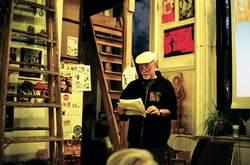Nowtopia: How Pirate Programmers, Outlaw Bicyclists, and Vacant-lot Gardeners are Inventing the Future Today

Veteran writer and activist Chris Carlsson’s new book is nothing short of an urban working-class blueprint for change. Drawing on Marxist theory and powerfully deconstructing modern assumptions about class and work, Nowtopia presents fringe utopian ideals as well-reasoned, proactive solutions for how to authentically survive in our struggling society. Profiling the sustainable work of diverse groups—including open-source programmers, biodiesel enthusiasts, and “burners”—Carlsson guides us through a deeper understanding of the current range of subversive political action one can take in everyday life. While dense at times, Nowtopia summarizes these ideas and exposes a variety of subcultures that, despite our capitalist society, are thriving gift economies, working beyond the traditional models of today.
Carlsson’s primary concern is that, as individuals, we have very little (if any) influence over what we, as a society, do together. Capitalism seems an inherent part of our lives, and consumerism has taken over everything—from our meaningful relationships to common, public space. Our reliance on science has deskilled entire generations, and to put our culture back on course, it is going to require “radical patience” and a new respect for modern permaculture (i.e., interconnected and systemic analysis of society and its problems).
Some of the most radical politics being practiced today take place in microcosms of larger social movements, establishing truly sustainable practice in a time when that buzzword means less and less. Vacant-lot gardeners reclaim public space in an effort to remove themselves from a capitalist food supply, and bicycle activists empower masses of riders to take back public streets. Biodiesel proponents turn functional automobiles into cars running outside the system and reclaim an existing technology for everyday people. And while Burning Man is an admitted outlier in terms of sustainability, the gathering does inspire many to, at least temporarily, vacate their cubicles and let themselves go. A hopeful read, Nowtopia looks to people putting radical thought into practice as examples of how we could all achieve better living conditions within the confines of contemporary society.
Seeing Carlsson at a book reading and discussion in Boston last month, the one criticism I’d had of the book was raised by another audience member. Despite the diversity of the subjects themselves, the ideas in this book are currently being pursued and promoted by an overwhelmingly white crowd. What do we do about that? In what was one of the more striking responses I’ve heard on this subject, Carlsson explained that just because we should de-center white experience does not mean it shouldn’t be in the frame. People making revolutionary change should be disregarded because of their privileged past? That doesn’t move anyone forward. So long as we continue to celebrate diverse paths to revolution, and do not harm others in our own pursuits, are we all not in this together?
Carlsson speaks at length, both in the book and in person, about class structure and the politics of work, and the real value of his contribution is the idea of workers' revolution. To understand your life as more than a daily mundane for-pay existence is a vital concept sometimes lost on us all. The numerous conversations that I’ve recently had on the subject—often with people in my own Millennial generation, who forget their true passions because they’re so lost between earning their paychecks and maintaining a life online—speak to the ways our culture has negated our experiences as individuals who do passionate work that involves no currency. We all have to pay rent, but to get beyond treating others merely as their one-dimensional, working day identity is the most innovative concept in Carlsson’s analysis, and this critique of our current model is incredibly timely and necessary. The larger picture contained in these models of rogue gardening and hacking are tools for unlocking a better collective future for our culture.
Photo credit: Andreas Haugstrup Pedersen